Disclaimer:
With 11+ years of experience & expertise in the real estate industry, Homebazaar provides end-to-end property-buying solutions. Hundreds of 100% verified RERA-registered residential & commercial properties are listed on our website. We provide facilities like Zero brokerage, 360° virtual street view, quick site visit services, end-to-end property buying agreements & documentation guidance and low-interest home loan assistance. This helped us gain the trust of 55,000+ clients across India & sold 6,500+ homes of top reputed developers.
Page Contents
Why Do Landlords Take A Deposit?
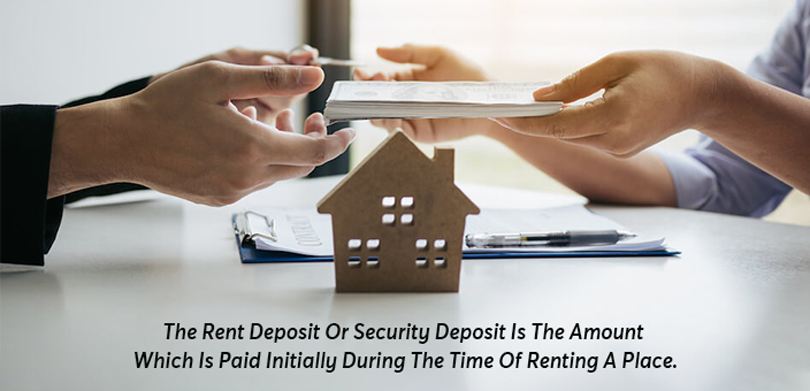
Renting a house includes keeping a security deposit according to the terms of the Rental Agreement. The security deposit by the renter is not a part of the monthly rent.
The rent deposit or security deposit is the amount which is paid initially during the time of renting a place. The landlord will keep the deposit with them throughout the rental agreement period. If there is damage to the property, then the renter will lose the money.
However, it is to be ensured that the due amount, rent amount, and method of payment should be written in the rental agreement.
The central aspect of a rent deposit is to provide the landlords with security from any damage to the property or in case the tenant fails to comply with the agreement.
The tenant will receive the deposit amount only after the completion of the lease period after the deductions are done (if any) as repair costs.
Rent Security Deposit Rules In Model Tenancy Act 2021
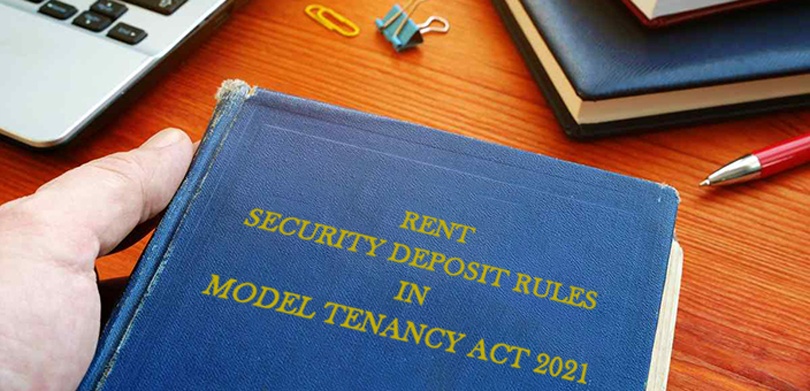
As per the Model Tenancy Act 2021, the security deposit should be paid by the tenant and the amount should be mutually agreed upon by the landlord and the tenant. The landlord should check that:
- The security deposit amount should not exceed the 2 months rent amount in case of residential property
- The security deposit amount should not exceed the 6 months rent amount in case of non-residential or commercial property
- The security amount should be returned to the tenant when taking over the vacant possession from the tenant after the deduction of any liability amount.
How Much Security Deposit Can A Landlord Charge In India?
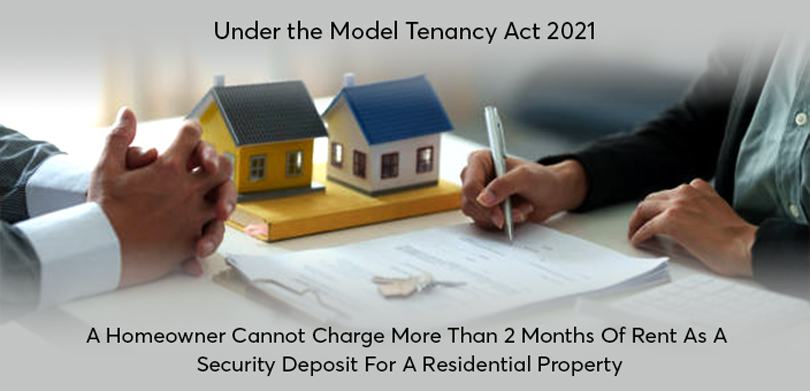
Under the Model Tenancy Act 2021, a homeowner cannot charge more than 2 months of rent as a security deposit for a residential property.
The Factors of Security Deposit in Rental Agreement
The landlord should keep the following points in mind when agreeing to the security deposit:
- The rental agreement received from the tenant should be declared in the rental agreement.
- The agreement should also state that the security deposit will be returned as the agreement expires or the tenant vacates the premise.
- The agreement should also mention that if any amount will be deducted from the security deposit, then the homeowner should justify it.
- The contract must be legally registered and signed by both parties.
- There should not be any hidden clause in the agreement.
Rent Deposit Calculation
For residential property, the maximum security deposit will be equal to 2 months’ rent amount. For example

Monthly Rent = Rs 15000
Then,
Security Deposit = 15000*2=30000
For non-residential property, the maximum security deposit will be equal to 6 months’ rent amount. For example

Monthly Rent = Rs 15000
Then,
Security Deposit = 15000*6=90000
Can Landlord Forfeit Deposit?
As per the rental agreement, the landlord can forfeit the security deposit of the tenant if there is a requirement for any repair and replacement.
However, it should also be noted that the landlord has to justify why they are deducting or forfeiting any amount from the security money when the tenant vacates the premise.
What If The Landlord Doesn’t Return The Deposit?
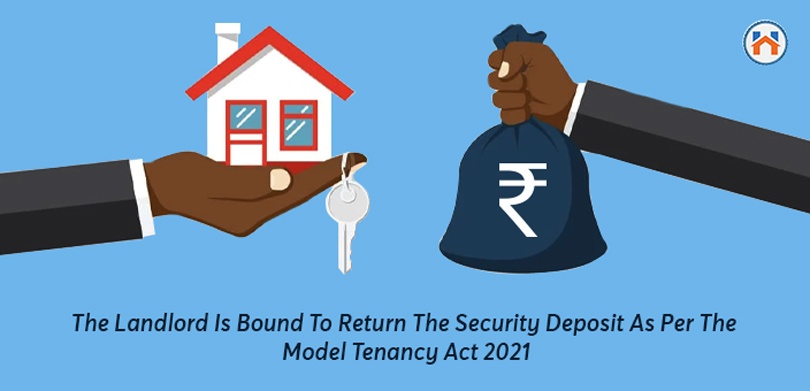
The landlord is bound to return the security deposit as per the Model Tenancy Act 2021. If the landlord has signed the rental agreement, then they should return the security money to the tenant when the agreement expires after deducting the required amount.
If the landlord is not returning the deposit money, then legal actions can be taken against them. The tenant can file a civil suit against the landowner for cheating and criminal breach of trust.
Basic Rules Both Tenant & Landowner Should Know
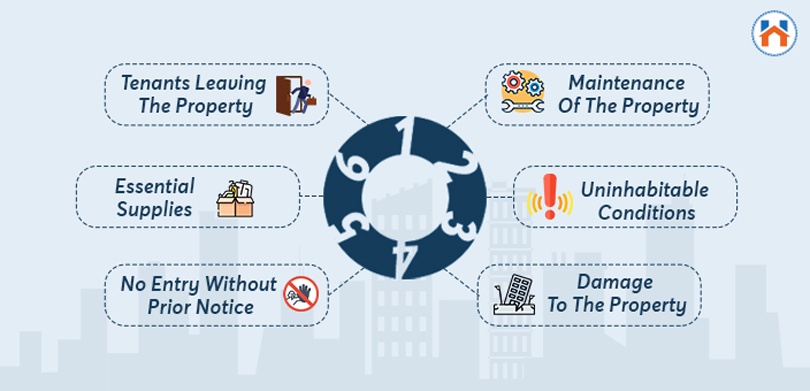
Apart from the written agreement, the security deposit and the rental amount, there are a few rules which should be followed by both parties:
- Maintenance of the property: Both parties are equally responsible for the maintenance of the property. There cannot be any renovation or repair of the property without the consent of both parties.
- Uninhabitable conditions: If the price of the maintenance is 50% more than the rent of the house then the property is considered uninhabitable. If the owner does not take any action, then the tenant can vacate the property within 15 days and ask to return the security deposit.
- Damage to the property: The tenant should be responsible for maintaining the property after they occupy the premise. If there is any damage, then the amount will be deducted from the security deposit.
- No entry without prior notice: As per the Model Tenancy Act, the landowner should give 24 hrs prior notice before visiting the property. The visit should be done between 7 am to 8 pm.
- Essential supplies: Water, electricity, sanitary service, etc should be provided to the tenant.
- Tenants leaving the property: Tenants should provide a one-month notice before vacating the premise.
FAQs
| Q: How do I get my deposit back from my landlord?
Ans: If your landlord is not returning your deposit, then you can end them a legal notice of returning the deposit along with interest till the date of your vacating the premise. You can also lodge a complaint against the owner. |
| Q: How much rent deposit can a landowner take?
Ans: Maximum of 2 months rent can be taken for residential property and 6 months rent for non-residential property. |
| Q: Are rental deposits refundable?
Ans: Yes, the rental deposit is refundable when the rental agreement expires or when the tenant vacates the premise. |
| Q: Can the landlord deduct the security deposit for cleaning?
Ans: The landlord can deduct an amount from the security deposit for damage or for deep cleaning and not for any normal wear and tear. |
| Q: Can I pay the last month’s rent from my deposit?
Ans: No, you cannot pay last month’s rent from your deposit because you are legally bound to pay your rent at the specified time and place. Not paying the rent will cause breaching the laws and legal actions can be taken against you. |








